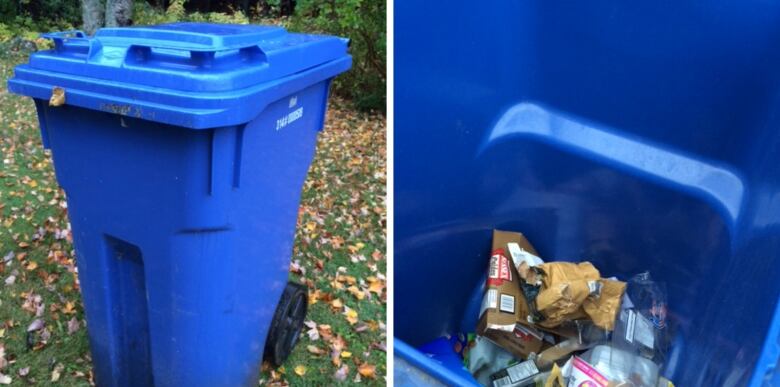McAdam residents lose recycling pickup, while village awaits provincial action
Temporary solution is to let residents take their recycling once a month to drop-off point
Starting next week, recyclables will start piling up in the village of McAdam.
Villagers were given blue wheeled recycling bins by the regional service commission earlier this year.
But McAdam's deputy mayor, Taylor Gallant, said the village doesn't have the equipment to pick up the big bins.
"In McAdam, we collect our garbage by half-ton trucks, so in order to pick up the big blue bins we would either have to upgrade our trucks, or install hydraulic lifts with a compactor which would cost tens of thousands of dollars to the municipality, something we cannot afford," Gallant said.
Gallant said part of the reason for not wanting to upgrade the trucks isthat the village is waiting for provincial action on the recycling front, although a provincial spokesperson suggested toCBCNews thatnothing is planned.

Contracting out collection isn't an option for the village of 1,151 people, Gallant said.
"It's going to cost, to contract recycling out, in the vicinity of about $50,000 a year."
Instead, the municipality is setting up a temporary program. Residents will be asked to hold on to their recyclables and drop them off once a month at the garbage transfer station at 66 West St. once a month, starting Sept. 26.
The regional service commission was discontinuing the community drop-off bins on Friday. It was losing $400,000 a year on the program and faced a$1.2 million price tag if it boughttwo new trucks for curbside pickup.
The monthly drop-off plan is the village's solution, but it won't work for all residents. Those without transportation won't be able to haul a month's worth of recycling to the drop-off location.
The regional service commission has not responded to a request for an interview.

Gallant said the village is waiting to see ifthe provincial government will follow other provinces and adopt an extended producer responsibility program for recycling "plastic printed paper," or PPP.
These programs put the cost of recycling programs on the industry producers that generate packaging waste.
"That's one of the reasons we didn't want to upgrade all of our trucks in the event that a PPP program was implemented," he said.
Asked about such a program, the Department of Environment and Local government suggested the province was waiting for the results of research by Recycle NB, which "has been actively researching Packaging and Printed Paper programs in Canada and other jurisdictions."
Recycle NB did notrespond to multiple requests for comment.
Study already complete
But Recycle NB and other recycling organizations from the Atlantic provinces were already part of a study of PPP programs in 2014.
Duncan Bury, a waste management consultant from Ontario who was involved in the study, said he thought New Brunswick was making plans for a program back then.
"Nothing seems to have been happened," he said.
At the time of the study, it was estimated a producer-paid recycling program for product packaging would mean $15 million for New Brunswick municipalities.
"It's a simple idea," Bury said. "If you're a brand owner of a product you become an obligated producer and you contribute and you help fund the curbside recycling program."
Industry pays up to 100% of costs
Similar programs exist in Quebec, Ontario, Manitoba, Saskatchewan and British Columbia.
In Quebec and B.C., 100 per cent of the cost of all recycling programs in the province is paid by industry producers. In Manitoba 80 per cent of the cost is covered, and 75 per cent in Saskatchewan.
Bury said in Ontario producers only contribute 50 per cent of the cost, and that comes to about $120 million a year for recycling programs.
"The municipality really had no ability to have an influence on what's put in these packaged products, how this packaging works, how recyclable it is," He said. "If you give this responsibility to the industry they then have the obligation to look after it and fund it."

The only concerns he could see about the program would be from small businesses, whichdon't want to be considered obligated producers. But he said all the other provinces have regulations that prevent small businesses from being affected.
"If you produce and put less than a million dollars worth of product onto the market in any jurisdiction then you don't have to contribute to the program."
The first step for a producer-paid recycling program in New Brunswick would be for the provincial government to pass regulations making sure all companies selling products in the province are obligated companies.
It then could take a year for industry to set up reporting and collection.
With files from Information Morning Fredericton and Information Morning Saint John












_(720p).jpg)


 OFFICIAL HD MUSIC VIDEO.jpg)
.jpg)



























































































